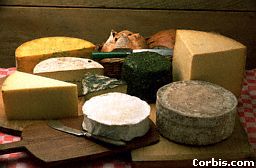| # To rid the inside of tea-kettle of its deposit build-up, simply fill the teakettle with a mixture of one part vinegar to six parts water, and let stand overnight. Next day, thoroughly was out the kettle. If necessary, you can repeat the process. # To remove a glued label from a new metal pot thoroughly and easily, simply apply a little rubbing alcohol, paint thinner, or lighter fluid rather than water. Or, if the label is on the outside of the pot, fill the utensil with boiling water and let stand for a few minutes. In most cases, the heat will loosen the glue's hold on the metal. # To separate stuck-together glasses, simply pour cold water into the inner glass, or use ice. Immediately immerse the outside of the outer glass in hot (not boiling) water and carefully pull the two apart. |
| (Source: Kitchen Science by Howard Hillman) |
| To learn more, simply click here Tips & Trick |
| # Cheeses # |
| For Longer Keeping - No more moldy cheese in the refrigerator: Moisten a paper towel with a bit of cedar vinegar and wrap it around your wedge of cheese; then place the wrapped cheese in a plastic bag and seal. The acid in the vinegar will keep mold away. If the paper towel dries out, moisten it with a bit of water-vinegar solution. - Ricotta and Cottage cheeses will store longer in the refrigerator once they've been epened if you turn the reclosed container upside down, thereby forcing some of the air out of the container. You can get the same results by taking the cheese out of its original container and storing it in a smaller glass jar. |
| Small or Large Eggs? If the difference in price between large and small eggs is 8c or less per dozen, the larger eggs are the better buy. If You Find a Crack You don't have to throw away the cracked raw eggs you find in the carton; use them, but only for egg dishes that are thoroughly cooked, such as hard-cooked eggs, or in baked goods. Checking for Freshness You can tell whether eggs are fresh or not by placing them in a deep pan of water. Any floaters should be thrown away; as an egg gets old it shrinks, and air fills the pocket that's been left, enabling the egg to float. The eggs lying on the bottom are fine to use. Storing - When you need to store raw eggs without the help of a refrigerator, such as during a camping trip, coat the eggs with shortening. It will help to preserve them longer by sealing out air. - Never wash eggs before storing them; you'll wash off their natural protective coating. - To preserve leftover egg yolks for future use, place them in a small bowl and cover them with about 2 tablespoons of vegetable oil. Make sure they are completely covered with oil. Egg yolks can be kept this way for a few days in the refrigerator. Freezing - Eggs can be frozen, but not in their shells, which would crack. If you want to freeze eggs, remove them from their shells and scramble them with 1 teaspoon of salt or 1 teaspoon of honey for each cup (about 5 eggs) to stabilize they yolks and prevent them from getting pasty after thawing. - You can pack scrambled eggs for the freezer together in one container or individually in ice cube trays. Three tablespoons of scrambled eggs equals one whole egg. How to Avoid Cracking Eggs - To prevent an egg from cracking while you're hard-cooking it, prick a small hole with a needle in one end so that air can escape. - Add a little vinegar to the water if an egg cracks during boiling. It will help seal the egg. Telling the Fresh Eggs from the Hard-Cooked Ones To code hard-cooked eggs so that they are distinguishable from the raw ones, just add a few yellow onion skins to the water while simmering; they will color the shells. More from Beaten Eggs Get more volume from beaten eggs by letting them stand at room temperature for about an hour before you beat them. A Free Egg Poacher An egg poacher or fried egg mold can be made by removing the top and bottom of a clean tuna can. |
| #Eggs # |
| (Souce: Rodale's Book of Hints, Tips & Everyday Wisdom) |
 |